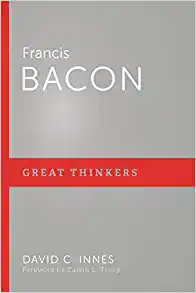
David C. Innes
Reviewed by: James S. Gidley
Francis Bacon, by David C. Innes. Great Thinkers Series, P&R, 2019. Paperback, 176 pages, $11.50. Reviewed by OP elder James S. Gidley.
“Why should a thoughtful, modern reader care about Francis Bacon (1561–1626)? The most pressing reason is that we live in Bacon’s world” (xxi). Francis Bacon is clear and concise, but it is still a scholarly work. At the beginning, there is a series introduction, a foreword, a preface, an introduction, and a list of abbreviations. At the end, there is a glossary, a bibliography, a Scripture index, and an index of subjects and names. Throughout the book, there are copious references to Bacon’s writings.
Though Bacon was not himself a scientist, he is rightly regarded as the founder of modern science. A philosopher, Bacon laid the foundations of modern science by expounding its method and aim. This makes it clear that science is philosophy; in Bacon’s day, it was called natural philosophy. Scientists today would bristle at the suggestion that they are engaged in philosophy, but the truth of the matter is that they have adopted Bacon’s system as the one true philosophy. He says:
Man, being the servant and interpreter of Nature, can do and understand so much and so much only as he has observed in fact or in thought of the course of nature. Beyond this he neither knows anything nor can do anything. (45)
This presupposition is embodied in the scientific method. For modern scientists, all knowledge is derived from observation and experiment.
Bacon also prescribed the aim of modern science: to generate useful knowledge for the benefit of mankind. Science should produce inventions that enhance material prosperity, and medical science should give us the good health to enjoy it. Thus, Bacon is the father not only of modern science but also of modern technology.
Innes presents a sustained biblical and theological critique. Perhaps his most important point is this: Jesus Christ has given us heaven, and Bacon was deliberately trying to supplant the heavenly hope with a worldly one. The challenge for Christians living in Bacon’s world is to hold on to heaven in the presence of so many worldly goods. Nevertheless, Innes does not propose the outright rejection of science and technology. His final chapter is entitled, “Redeeming Bacon’s Legacy: A More Godly Dominion.”
This is a challenge for me, as I draw near to the end of my career as a professor of engineering, ostensibly aiding and abetting Bacon’s project. This fall I will point my senior civil engineering students, perhaps for the last time, to Psalm 104. There God provides not only plants, but also oil, wine, and bread (vv. 14–15). The sea is the home not only of Leviathan, but also of the ships (vv. 25–26). God provides not only nature, but also technology.
September 07, 2025
August 31, 2025
J. N. Darby and the Roots of Dispensationalism
August 24, 2025
August 17, 2025
Reformed Covenant Theology: A Systematic Introduction
August 10, 2025
August 03, 2025
July 27, 2025
© 2025 The Orthodox Presbyterian Church